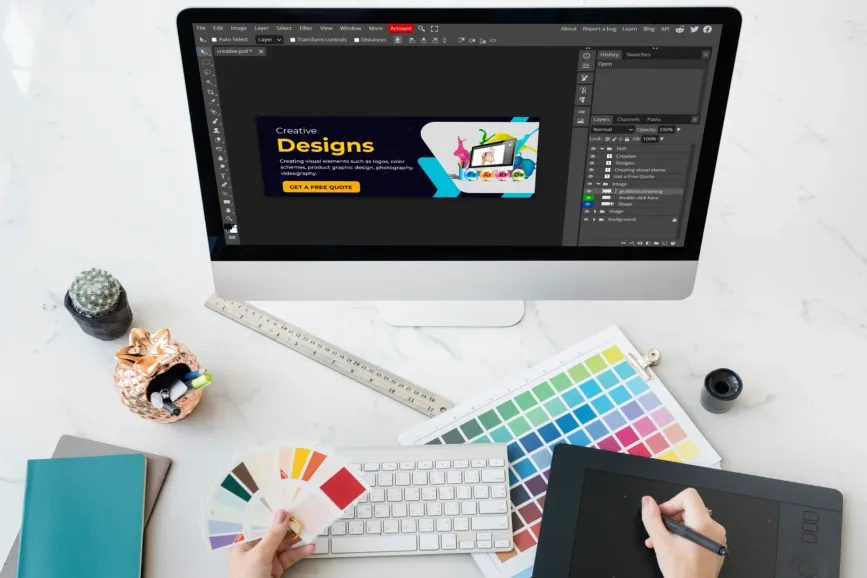How To Choose The Right Website Design And Development Agency?

In today’s digital age, having a professional website is crucial for any business. But choosing the right website design and development agency can be daunting. Here’s a step-by-step guide to help you navigate the process.
Understanding Your Needs
Before diving into the search for an agency, you need to clearly understand your own needs.
Define Your Goals
What do you want your website to achieve? Whether it’s increasing sales, building brand awareness, or providing information, your goals will shape your website’s design and functionality.
Determine Your Budget
Knowing your budget upfront helps narrow down your options and ensures you don’t waste time considering agencies that are out of your price range.
Identify Your Target Audience
Understanding who your website is for will influence its design, content, and functionality.
Researching Potential Agencies
2Lorem ipsum dolor sit amet, consectetur adipisicing elit, sed do eiusmod
Where to Look for Agencies
Start by searching online, asking for recommendations, and looking at industry-specific directories.
Evaluating Portfolios
Reviewing portfolios gives you a sense of an agency’s style and capabilities. Look for projects similar to what you have in mind.
Reading Client Testimonials
Client testimonials provide insight into the agency’s reliability and quality of service. Look for detailed feedback that covers various aspects of their work.
Evaluating Expertise and Experience
Industry Experience
An agency familiar with your industry will better understand your needs and challenges.
Technical Expertise
Ensure the agency is proficient in the latest technologies and platforms that are relevant to your project.
Creativity and Innovation
A good agency should not only be technically sound but also creative and innovative.
Checking Case Studies
Importance of Case Studies
Case studies showcase an agency’s problem-solving abilities and successes.
What to Look for in Case Studies
Look for detailed explanations of the challenges faced, solutions provided, and results achieved.
Analyzing Case Study Results
Consider how the results align with your own goals and expectations.
Assessing Communication and Collaboration
Importance of Good Communication
Clear and consistent communication is key to a successful partnership.
Initial Consultation
Use the initial consultation to gauge their communication style and responsiveness.
Ongoing Collaboration
Ensure they have a structured process for ongoing collaboration throughout the project.
Understanding the Development Process
Stages of Website Development
Familiarize yourself with the stages of development: discovery, design, development, testing, and launch.
Agile vs. Waterfall Methodologies
Understand the differences between Agile and Waterfall methodologies to determine which aligns better with your needs.
Timeframes and Milestones
Discuss timeframes and set realistic milestones to keep the project on track.
Considering Design Capabilities
Importance of Aesthetics
A visually appealing website attracts and retains visitors.
User Experience (UX) Design
UX design focuses on providing a smooth and enjoyable user journey.
Responsive Design
Ensure the agency can create a website that works well on all devices, from desktops to smartphones.
Evaluating Technical Skills
Front-End and Back-End Development
Verify that the agency has expertise in both front-end (user interface) and back-end (server-side) development.
Integration with Third-Party Tools
Check their ability to integrate with necessary third-party tools like CRM systems, payment gateways, etc.
SEO and Performance Optimization
The agency should be knowledgeable about SEO best practices and performance optimization to ensure your site ranks well and loads quickly.
Ensuring Post-Launch Support
Maintenance and Updates
Discuss their policies on maintenance and updates post-launch.
Troubleshooting and Bug Fixes
Ensure they offer support for troubleshooting and fixing any bugs that arise.
Long-Term Support Plans
Look for agencies that provide long-term support plans to help your website evolve over time.
Checking Pricing and Contracts
Understanding Pricing Models
Understand whether the agency charges a fixed price, hourly rate, or retainer fee.
Contract Terms and Conditions
Review the contract terms carefully, paying attention to the scope of work, timelines, and payment schedules.
Hidden Costs to Watchout For
Be aware of any potential hidden costs, such as additional charges for revisions or updates.
Reading Reviews and Ratings
Importance of Online Reviews
Online reviews can provide an unbiased view of the agency’s performance.
Where to Find Reliable Reviews
Look for reviews on multiple platforms, including Google, Yelp, and industry-specific sites.
How to Interpret Reviews
Pay attention to both positive and negative reviews to get a balanced understanding.
Visiting the Agency
Importance of a Face-to-Face Meeting
Visiting the agency in person can give you a better sense of their working environment and culture.
What to Ask During a Visit
Prepare questions about their process, team structure, and previous work.
Getting a Feel for the Team
Meeting the team can help you assess whether they are a good fit for your project.
Making the Final Decision
Weighing Pros and Cons
List the pros and cons of each agency based on your research and interactions.
Getting a Second Opinion
Seek opinions from colleagues or industry peers to help validate your choice.
Trusting Your Instincts
Ultimately, trust your instincts and choose the agency you feel most confident in.
Conclusion
Choosing the right website design and development agency requires careful consideration of many factors, from understanding your own needs to evaluating the agency’s expertise and communication skills. By following these steps, you can find a partner that will help you create a successful and impactful website.
Frequently Asked Questions (FAQs)
The timeline for website development varies based on the project’s complexity, but typically it can take anywhere from a few weeks to several months.
Prepare a clear outline of your goals, budget, and target audience. Having examples of websites you like can also be helpful.
Evaluate their portfolio, expertise, communication style, and client reviews. A good fit will align with your needs and vision.
Red flags include lack of transparency, poor communication, unrealistic promises, and negative reviews.
Yes, you can switch agencies, but it’s important to review the terms of your contract to understand any potential penalties or obligations.